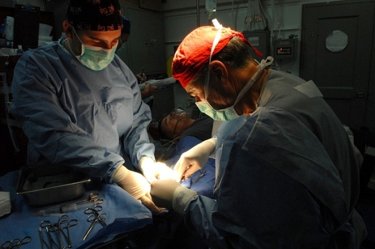What are the most common nasal conditions that require an ENT doctor? ENT specialists treat tumors of the neck and head along with other conditions. Some of these conditions include infections (ear, nose, and throat), swallowing disorders, sleep apnea, breathing difficulties, and more. While your general healthcare doctor may handle short-term and acute ENT problems, you have to visit an otolaryngologist for effective treatments for chronic medical conditions and issues relating to ENT.

(Source)
What are the Types of Nasal Conditions that an ENT Doctor Treats?
Sinus Infections
Sinus infections occur due to blockage in the nasal cavities. Blockage can occur due to inflammation, swelling, and bacteria or viruses. Sinusitis is the common name of this condition which remains persistent after the respiratory symptoms fade.
However, it can also occur due to nasal polyps, tooth infections, and allergies, which cause sinus pain. Acute sinusitis may not last for long and trigger mild symptoms like respiratory illness or cold. Conversely, chronic sinusitis can persist for weeks and cause severe symptoms and pain.
Snoring
Snoring is a common problem, which can quite quickly turn into a chronic condition if left untreated. Often, chronic snoring is a symptom or sign of serious underlying medical conditions or diseases such as sleep apnea. Snoring occurs when the airflow passages in your mouth vibrate due to the contact of air movement with relaxed tissues such as the soft palate and tongue.
Obstructive Sleep Apnea
Sleep apnea is a condition in which a person stops breathing involuntarily for short periods while sleeping at night. This condition can become chronic and is called OSA (Obstructive Sleep Apnea). Usually, the air moves freely from the mouth to the lungs. However, during OSA, the airway passage in the throat becomes narrow, which causes difficult air movement in and out of the lungs. This narrow passage hinders breathing which can often result in snoring. Not attending to this condition can lead to serious health concerns such as strokes, disturbed sleep, diabetes, hypertension, and more.
Allergic Rhinitis
Allergic rhinitis is an autoimmune system response that occurs due to environmental triggers. When your body comes in contact with an allergen such as pollen which is highly common, your immune system triggers a response to fight it off. This leads to an allergic reaction. Symptoms could include sneezing, runny nose, itchiness, watery eyes, stuffy nose, and more. Eyelids swelling and headaches are signs of chronic allergic rhinitis. An ENT specialist might suggest treatment options or recommendations depending on the symptoms of allergic rhinitis.
What Are the Common Nasal Procedures that an ENT Performs?
Treatment for Sinus Infections
For treating sinus infections, your ENT surgeon will use endoscopy to view your sinus anatomy for the surgical procedure that follows as treatment. They will insert an endoscope in your nostrils that will have a light source and camera attached to it. Viewing high-resolution footage of your nasal passage, the ENT specialist will carry out the required surgeries. They may correct a deviated septum, reduce turbinates (nasal bone structures), and remove excess tissue and/or polyps. The procedure usually takes no more than two hours.
Treatment for Snoring
Because snoring is a common problem, there are various non-surgical treatment options that your ENT surgeon may suggest. These may include dental mouthpieces that will readjust your tongue’s position to prevent the airway from getting blocked. Your ENT surgeon may also perform septoplasty to reduce the excess tissue in your nostrils that may be causing deviated septum and, consequently, snoring.
Other surgical procedures include palatal implants and laser surgeries to adjust and reposition the soft palate in your mouth. While mouthpieces require frequent applications, corrective surgical procedures are permanent solutions.

(Source)
Treatment for Obstructive Sleep Apnea
There are many different types of medical treatments that you can avail of to help you with OSA. Despite that, your ENT surgeon may perform one of these two most common surgical procedures to treat OSA:
Tracheostomy: This involves puncturing one of the openings in your windpipe to move past the obstruction in your throat.
UPPP (Uvulopalatopharyngoplasty): In this surgical procedure, your ENT surgeon uses precise instruments to remove any excess tissue at your throat’s back. This helps in clearing the airway to reduce snoring.
Treatment for Allergic Rhinitis
Acute Rhinitis is short-term and can relieve within a short period with the right medication and home care. Conversely, in the case of chronic allergic rhinitis, the ENT surgeon may suggest saltwater solutions for gargling and advise to prevent exposure to allergens. Antihistamines also help with alleviating the symptoms of chronic allergic rhinitis. Desensitization injections are a minimally invasive treatment option that helps in controlling allergic reactions.
Common Nasal Conditions Requiring an ENT Doctor: Conclusion
Call us at 212-867-4813 to get in touch with Dr. Michael C. Burnett, MD, at Ear, Nose & Throat of New York. He offers the best, specialized care for ENT-related conditions, diseases, and disorders.
With individualized attention, Dr. Burnett delivers optimum patient care. Visit us in-person at 115 East 57th Street Suite 600 New York, NY 10022.
https://earnosethroatofnewyork.com/
Reference Links
https://www.healthline.com/health/cold-flu/sinus-infection-symptoms
https://www.mayoclinic.org/diseases-conditions/chronic-sinusitis/symptoms-causes/syc-20351661
https://www.healthline.com/health/sleep/obstructive-sleep-apnea
https://www.verywellhealth.com/what-are-ent-disorders-1191839















